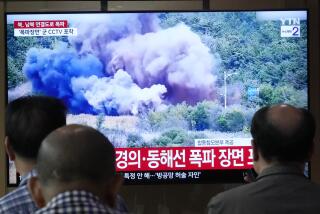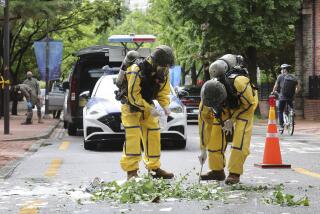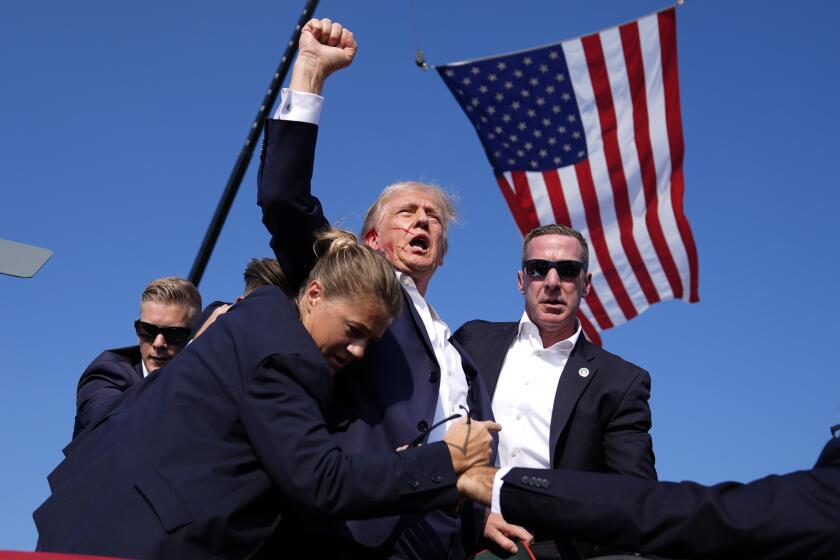Google this: North Korea open to Western help with Net upgrade?
A freelance diplomatic foray to North Korea by former New Mexico Gov. Bill Richardson and Google executive Eric Schmidt has kicked up both controversy and expectations of insights into the inscrutable Hermit Kingdom.
State Department officials discouraged Richardson from embarking on his private mission, warning that it could send a wrong signal to North Korea’s new leadership after its provocative Dec. 12 missile launch. The move, in violation of United Nations resolutions, was widely seen as a test of the North’s ability to lob a nuclear bomb at the United States.
But in the absence of any functioning diplomatic channel between Washington and Pyongyang, foreign affairs analysts say the private delegation could get a rare peek into the secretive regime of freshman leader Kim Jong Un and a chance to gauge prospects for reform and modernization.
Richardson, a former congressman and U.N. ambassador, has been successful in past efforts to gain freedom for Americans detained by Pyongyang. His current visit has raised slim hopes that he can secure the release of a Korean-born American held since November, or at least lay the groundwork for eventual freedom for 44-year-old tour guide Kenneth Bae.
Schmidt’s presence in one of the world’s least wired countries is particularly intriguing, said Suzanne DiMaggio, vice president for global policy programs at the Asia Society.
“Is this business component of Google’s participation a carrot they’re hoping to dangle in front of Pyongyang?” DiMaggio wondered. “Bringing in a business leader like Eric Schmidt could be an interesting point of entry to have a different kind of discussion while the nuclear talks are not on track.”
Six-party negotiations aimed at reining in North Korea’s nuclear ambitions have been hamstrung by disputes among the member states since they began a decade ago, and Pyongyang’s 2009 withdrawal has put the forum in a deep freeze. Three rocket launches and an underground nuclear test since have led to a full breakdown of communication.
The Richardson visit, which the veteran politician has called “a private, humanitarian mission,” offers an opportunity to break the silence but runs the risk of being misconstrued as an official gesture by Washington, said Robert Hathaway, Asia Program director for the Woodrow Wilson International Center for Scholars.
“At a minimum, they risk sending conflicting signals to a North Korean leadership that probably doesn’t have a very good read on the way in which U.S. policy is made,” Hathaway said. “They don’t understand the role of independent actions in the whole policy process.”
But the same criticism was directed at former President Carter when he ventured to North Korea in 1994 in the midst of seething tensions on the divided peninsula, Hathaway recalled.
“In retrospect, virtually everybody now agrees it was a significant step in defusing a very serious crisis,” said Hathaway, a House Foreign Affairs Committee staffer at the time. Today, Carter is credited with averting war between the two Koreas and for rekindling diplomacy that slowed Pyongyang’s nuclear buildup for the next decade.
The Richardson-Schmidt trip has reignited the debate over whether engagement or isolation work better in taming rogue nations, but neither approach has racked up much success in North Korea. Kim and his late father exploited several gestures of conciliation by the Obama administration, most blatantly when Pyongyang reneged on a Feb. 29, 2012, agreement that would have delivered desperately needed food aid. Pyongyang’s April 13 rocket launch, though a spectacular failure, scuttled the humanitarian relief mission and severed what few back-channel contacts were still in place.
Twenty years of carrot-and-stick diplomacy has taught the North Koreans that “to get what they want, it’s best to beat us up now and then with missile shots and nuclear tests,” said Douglas Paal, vice president for studies at Carnegie Endowment for International Peace. He sees the detention of Bae on vague accusations of “hostile acts” as a similar plea for Washington’s attention.
China has maintained economic lifelines to North Korea despite international sanctions, allowing Pyongyang to pursue its nuclear programs to an extent that no one now reasonably expects the North to negotiate any rollback, Paal said.
A strategy of isolation works only if the international community is united, he said, pointing to the global boycott that broke down South Africa’s apartheid regime.
“The jury is still out on Burma,” Paal said of reforms underway in the former pariah state also known as Myanmar. International sanctions probably worsened economic and social hardships, but the military dictatorship may have decided on its own that reform offered a better future, he said.
In Cuba, the effects of a 40-year U.S. embargo were diluted by Soviet aid until Havana’s communist ally collapsed in 1991. The campaign to starve and isolate the Castro regime was further undermined in the post-Soviet period by investments from Europe, Mexico, Canada and Venezuela, Paal noted.
He sees little to be gained by Google in a country where Internet access is strictly controlled. The heavily censored cyberspace made available by the regime is accessible to only a mere few thousand students and scientists.
“If Kim Jong Un uses this visit as an opportunity to send a signal, that would be interesting,” Paal said of the potential, however remote, that the new leader might want Western collaboration in getting his country more widely wired. “For all we know, he may have a Facebook page.”
ALSO:
India accuses Pakistani troops of killing two soldiers
Iranian officials praise Assad speech panned in West
Chinese news organizations rally behind censored paper
A foreign correspondent for 25 years, Carol J. Williams traveled to and reported from more than 80 countries in Europe, Asia, the Middle East and Latin America.
More to Read
Sign up for Essential California
The most important California stories and recommendations in your inbox every morning.
You may occasionally receive promotional content from the Los Angeles Times.










